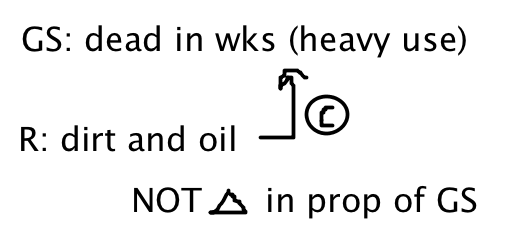-
Target Test Prep 20% Off Flash Sale is on! Code: FLASH20
Redeem
How to Master GMAT CR Evaluate Questions
 Some people love Evaluate the Argument questions but most people find them pretty annoying.
Some people love Evaluate the Argument questions but most people find them pretty annoying.
Try this problem from the free questions that come with the GMATPrep software and then well talk about why!
Guitar strings often go deadbecome less responsive and bright in toneafter a few weeks of intense use. A researcher whose son is a classical guitarist hypothesized that dirt and oil, rather than changes in the material properties of the string, were responsible.Which of the following investigations is most likely to yield significant information that would help to evaluate the researchers hypothesis?
(A) Determining if a metal alloy is used to make the strings used by classical guitarists
(B) Determining whether classical guitarists make their strings go dead faster than do folk guitarists
(C) Determining whether identical lengths of string, of the same gauge, go dead at different rates when strung on various brands of guitars
(D) Determining whether a dead string and a new string produce different qualities of sound
(E) Determining whether smearing various substances on new guitar strings causes them to go dead
Got your answer? Before we dive into the solution, tell me what youre supposed to be doing for Evaluate questions in general. Whats the goal? (Okay, I cant hear you. But say it out loud anyway. Youll be able to hear whether your explanation is convincing.)
If youre going to do well on Critical Reasoning, then youve got to be able to articulate the goal for the particular sub-type of CR problem that youre facing right now. This also requires you to identify that sub-typemore on that in a minute.
Evaluate the Argument questions are asking you to find an answer choice that could simultaneously strengthen and weaken the argument, depending upon the outcome of the evaluation.
For instance, heres an argument:
I will be more likely to learn a new word if I see it written down than if I hear it said aloud.
How could you evaluate this hypothesis?
(A) Whether I am above average at the task of learning new words
(B) Whether I learn more in a set of 10 new words given to me in writing than in a set of 10 new words said aloud
Heres how to test the two answer choices:
Answer (A): Yes, I am above average. How does that affect whether Ill learn better in written or oral form? It doesnt.
No, I am not above average. How does that affect? It doesnt.
Answer (B): I learn more of the 10 words given in writing than those said aloud. This supports, or strengthens, my conclusion.
I learn fewer of the 10 words given in writing than said aloud. This weakens my conclusion.
The correct answer, in this case (B), can go both ways (strengthening and weakening), depending upon the outcome of that evaluation. The other answer neither strengthens nor weakens my conclusion.
Another wrong answer trap might only strengthen or it might only weaken but not do both at the same time. The correct answer must both strengthen and weaken. This is exactly why so many people dislike this question type: it can be challenging to figure out which answer choice does both.
Now that you know all that, take a look at the problem again to see whether you still like your original answer. Okay, lets break this problem down!
Step 1: Identify the Question
A lot of the time, Evaluate questions will have the word evaluate (or evaluating) right in the question stem, as this problem does. You may also see synonyms such as determine, useful to know, or important to research (or establish).
As soon as you identify the question as an Evaluate question, you now know that you have an Assumption Family question, so the argument will contain a conclusion, as well as some unstated assumptions. Itll be important for you to deconstruct that full argument arc (from premises to conclusion).
Step 2: Deconstruct the Argument
The first sentence is a fact and it sets the context for the rest of the argument. Guitar strings can go dead pretty quickly (I was surprised that it was that fast!).
Someone has a hypothesis: dirt and oil cause the strings to go dead, not changes in the fundamental or material properties of the string. Maybe that last part is the prevailing hypothesis? I dont know.
How are you getting that all down on your scrap paper? Id draw something like this:
Step 3: State the Goal
On Evaluate questions, the goal is to find one answer choice that could simultaneously strengthen and weaken the given conclusion. The correct answer has to do both.
So, in this case, the correct answer has to simultaneously strengthen and weaken the idea that it really is dirt and oil causing the guitar strings to go dead.
Step 4: Work from Wrong to Right
All right, lets start evaluating those answer choices!
(A) Determining if a metal alloy is used to make the strings used by classical guitarists
He thinks the issue is not based on the material properties of the string. So would determining something about those properties help?
Maybe an answer could help to show that the guy is right about strings not going dead due to the material properties, but this answer doesn't do that. If a metal alloy is usedwe still dont know whats causing the strings to go dead. Ditto if a metal alloy is not used. Either way, this piece of information doesnt get us any further with the argument.
(B) Determining whether classical guitarists make their strings go dead faster than do folk guitarists
If classical guitarists make their strings to dead fasterthen I still dont know whats causing that to happen in the first place: dirt and oil or properties of the string.
(C) Determining whether identical lengths of string, of the same gauge, go dead at different rates when strung on various brands of guitars
Lets see. If they do go dead at different ratesthen I still dont know whether thats because of dirt and oil or because of the properties of the string. The brand of guitar doesnt impact those two things. Try the next one!
(D) Determining whether a dead string and a new string produce different qualities of sound
The argument focuses on what causes the strings to go dead, not the differences between dead and new strings. Presumably, dead strings do produce different sounds. After all, the argument says they are less responsive and bright in tone. But this still doesnt tell us why.
(E) Determining whether smearing various substances on new guitar strings causes them to go dead
Check it out! If smearing substances on new strings does cause them to go dead, then the authors argument is strengthened: it is somewhat more likely that hes right that the dirt and oil cause the deadness. If, on the other hand, smearing substances on the strings does not cause them to go dead, then the argument is weakened: it is somewhat less likely that dirt and oil are the root cause.
The correct answer is (E). Its the only one that both strengthens and weakens the argument.
What did you learn on this problem? Come up with your own takeaways before you read mine below.
Key Takeaways for Evaluate Problems:
(1) Know how to identify the question type (evaluate, determine, useful to know) and what youre trying to do: find a choice that both strengthens and weakens the conclusion.
(2) Understand how the argument works: what are the premises and what is the authors main claim? Make sure that you know exactly what distinctions the argument is trying to make. Those distinctions are going to be key in finding the right answer and not falling for a trap answer. In this case, the distinction is between dirt and oil, on the one hand, and the material properties of the string on the other.
(3) Watch out for trap answers that talk about things related to the argument but not at issue in the fundamental claim being made. In the problem above, answers (A) and (C) both mentioned properties of the string (material used and length) but did not actually address what was potentially causing strings to go dead. The correct answer must at least address the question of strings going dead!
* GMATPrep questions courtesy of the Graduate Management Admissions Council. Usage of this question does not imply endorsement by GMAC.
Recent Articles
Archive
- April 2024
- March 2024
- February 2024
- January 2024
- December 2023
- November 2023
- October 2023
- September 2023
- July 2023
- June 2023
- May 2023
- April 2023
- March 2023
- February 2023
- January 2023
- December 2022
- November 2022
- October 2022
- September 2022
- August 2022
- July 2022
- June 2022
- May 2022
- April 2022
- March 2022
- February 2022
- January 2022
- December 2021
- November 2021
- October 2021
- September 2021
- August 2021
- July 2021
- June 2021
- May 2021
- April 2021
- March 2021
- February 2021
- January 2021
- December 2020
- November 2020
- October 2020
- September 2020
- August 2020
- July 2020
- June 2020
- May 2020
- April 2020
- March 2020
- February 2020
- January 2020
- December 2019
- November 2019
- October 2019
- September 2019
- August 2019
- July 2019
- June 2019
- May 2019
- April 2019
- March 2019
- February 2019
- January 2019
- December 2018
- November 2018
- October 2018
- September 2018
- August 2018
- July 2018
- June 2018
- May 2018
- April 2018
- March 2018
- February 2018
- January 2018
- December 2017
- November 2017
- October 2017
- September 2017
- August 2017
- July 2017
- June 2017
- May 2017
- April 2017
- March 2017
- February 2017
- January 2017
- December 2016
- November 2016
- October 2016
- September 2016
- August 2016
- July 2016
- June 2016
- May 2016
- April 2016
- March 2016
- February 2016
- January 2016
- December 2015
- November 2015
- October 2015
- September 2015
- August 2015
- July 2015
- June 2015
- May 2015
- April 2015
- March 2015
- February 2015
- January 2015
- December 2014
- November 2014
- October 2014
- September 2014
- August 2014
- July 2014
- June 2014
- May 2014
- April 2014
- March 2014
- February 2014
- January 2014
- December 2013
- November 2013
- October 2013
- September 2013
- August 2013
- July 2013
- June 2013
- May 2013
- April 2013
- March 2013
- February 2013
- January 2013
- December 2012
- November 2012
- October 2012
- September 2012
- August 2012
- July 2012
- June 2012
- May 2012
- April 2012
- March 2012
- February 2012
- January 2012
- December 2011
- November 2011
- October 2011
- September 2011
- August 2011
- July 2011
- June 2011
- May 2011
- April 2011
- March 2011
- February 2011
- January 2011
- December 2010
- November 2010
- October 2010
- September 2010
- August 2010
- July 2010
- June 2010
- May 2010
- April 2010
- March 2010
- February 2010
- January 2010
- December 2009
- November 2009
- October 2009
- September 2009
- August 2009
